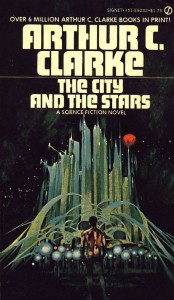 Welcome to the second installment of Dust Jacket, Nerd Culture Podcast’s fortnightly review of the greatest Sci-Fi novels of all time. I’m joined by Luke Walker, NCP regular and world’s harshest critic.
Welcome to the second installment of Dust Jacket, Nerd Culture Podcast’s fortnightly review of the greatest Sci-Fi novels of all time. I’m joined by Luke Walker, NCP regular and world’s harshest critic.
This week, we’re turning our eye to Arthur C. Clarke’s 1956 classic The City and the Stars.
WHAT YOU NEED TO KNOW
Diaspar is the final refuge of mankind, a sprawling cityscape protecting its inhabitants from the ravaged earth that lies beyond its protective dome. In this seemingly Utopian world, there is no poverty, no disease, no strife. The city is run by an artificial intelligence known as the Central Computer, allowing the citizens of Diaspar dedicate their long lives to art and creativity.
The Diasparans are essentially immortal. They live for thousands of years, never aging or dying. When they grow tired of life, their consciousness is absorbed into a vast memory bank, where it is stored for centuries, until it is reborn in fully grown bodies created by matter replicators.
Despite this seeming utopia, Diaspar is culturally stagnant. The city has remained the same for countless millennia.
Our protagonist is Alvin, an anomaly in this seemingly perfect world. He lives in a culture that can easily tend to his every need, yet remains discontent. He feels trapped within his utopian society and longs to explore the world beyond Diaspar.
Escaping the confines of the city, he begins to unlock the mysteries of his world and discover the secret billion year history of humanity. Along the way, he discovers new cities, ventures into space, and meets whole new life forms.
WHAT WE THOUGHT
DAVID: Alvin is a classic sci-fi protagonist – the dissatisfied rebel longing for something greater and seeking the mysteries of life. He’s an instantly relatable character, one that really draws you into the story very quickly and carries you through his quest into the unknown. It’s impossible not to sympathise with the frustration and stifling confinement Alvin feels within Diaspar, or the sense of awe and wonder he experiences as he journeys into the great unknown.
LUKE: ‘I think the rules are stupid,’ Alvin says in chapter 1. He is a boy/man who will think for himself. He sees dreams and possibilities where others see nightmares and destruction. ‘Here was the barrier that sundered him from all the people of his world, and which might doom to a life of frustration,’ writes Clarke. His is a coming of age story. He is an archetype. Neither clichéd nor caricature, his motives and desires are entirely believable. And there is a mystery surrounding him. He is one of those considered Unique, a classification belonging to very few in Diaspar’s history, and one of the many puzzles he must solve.
DAVID: Fortunately, Clarke has also created a truly fascinating world for Alvin to inhabit. Diaspar is a seemingly utopian society, but its inhabitants have lost the drive to seek out the unknown and evolve culturally. Escaping the confines of his home, he discovers Lys, less technologically advanced but more embracing of change then Diaspar. The parallels and contrasts are fascinating and explored in just enough detail to inform and entertain, without ever derailing the narrative.
LUKE: Those parallels are what the narrative is about. The story is how, in order for the human race to survive, thrive and evolve, Alvin must try to bring both cultures together. He only does this by recognising Lys’ need for technological achievement, and Diaspar’s need for struggle. A weighty task that throws a lot of barriers in front of our hero.
DAVID: The history of Earth is equally fascinating. The billion year history of humanity has been lost to the sands of time, forgotten by the insular inhabitants of Diaspar. It is the slow unraveling of this forgotten knowledge that drives Alvin, and the mystery of the lost history of Earth that provides the hook for readers.
LUKE: It’s interesting how in both Non-Stop and this, the world is a mystery our characters need to solve in order to achieve their goals. World building is a key attribute of SF, but Clarke doesn’t give us everything up front. Instead we get a wonderfully lyrical prologue that tells us enough to get us into the story. Then he lets Alvin be the main character and seek the knowledge for himself. The story is never bogged down in erroneous detail or history.
DAVID: Clarke also populates his world with a fascinating array of supporting characters. Jeserac, Alvin’s tutor, provides an early counterpoint of Alvin’s developing philosophies, as well as serving as the primary authority figure for our protagonist to rebel against.
As interesting as he is, though, he pales compared to Alvin’s two most prominent guides. Khedron the Jester and Vandamonde. Khedron is a cultural anomaly like Alvin, whose isolation from society parallels our protagoinst’s. He provides Alvin with the earliest clues to the nature not only of Diaspar but of Alvin himself. Later, Alvin encounters the equally fascinating immortal Vanamonde.
LUKE: A world is only as interesting as its characters. Mystery will keep a story intriguing. Characters get it started and keep it going. Here Clarke gives us one of the great supporting characters of SF. Ladies and gentlemen I give you: Khedron the Jester. Part of a tradition of characters who are clowns but no fools, he is that random element that keeps life from becoming dull. However, after incidents related in the book, he’s lost faith in himself and sees in Alvin not just a kindred spirit, but the one thing he can longer be; an agent of change. Part mentor, part comedy relief, part tragic figure, Khedron never overwhelms the story, but becomes instrumental in Alvin’s.
This is up there among the best in SF. Clarke manages to create an intriguing, imaginative yet believable future, but never loses sight of his character’s purpose and journey. He keeps his prose clipped and to the point, but never makes the story feel disjointed.
4 Lukes.
DAVID: Couldn’t agree more. 4 Lukes from me as well.
WHAT DO YOU THINK?
Is The City and the Stars worth of the praise we’ve lavished upon it? Does it deserve the 4 Luke ranking we’ve given it? Send us your comments, criticisms and, most importantly, your votes! Help us compile the definitive list of Greatest Sci-Fi Masterpieces.
THE RANKINGS
Well, only two books in right now, but it’s a start.
POSITION TITLE AUTHOR RANKING
1 The City and the Stars Arthur C. Clarke 4
2 Non-Stop Brian Aldiss 3.5
BEHOLD…THE FUTURE!
Join us next week (that’s right, next week!) for a special edition of Dust Jacket, where I’ll be summarising the NCP crew’s podcast review of Foundation. Then, in two weeks, we’ll be looking at Ian M. Banks’ Player of Games.








